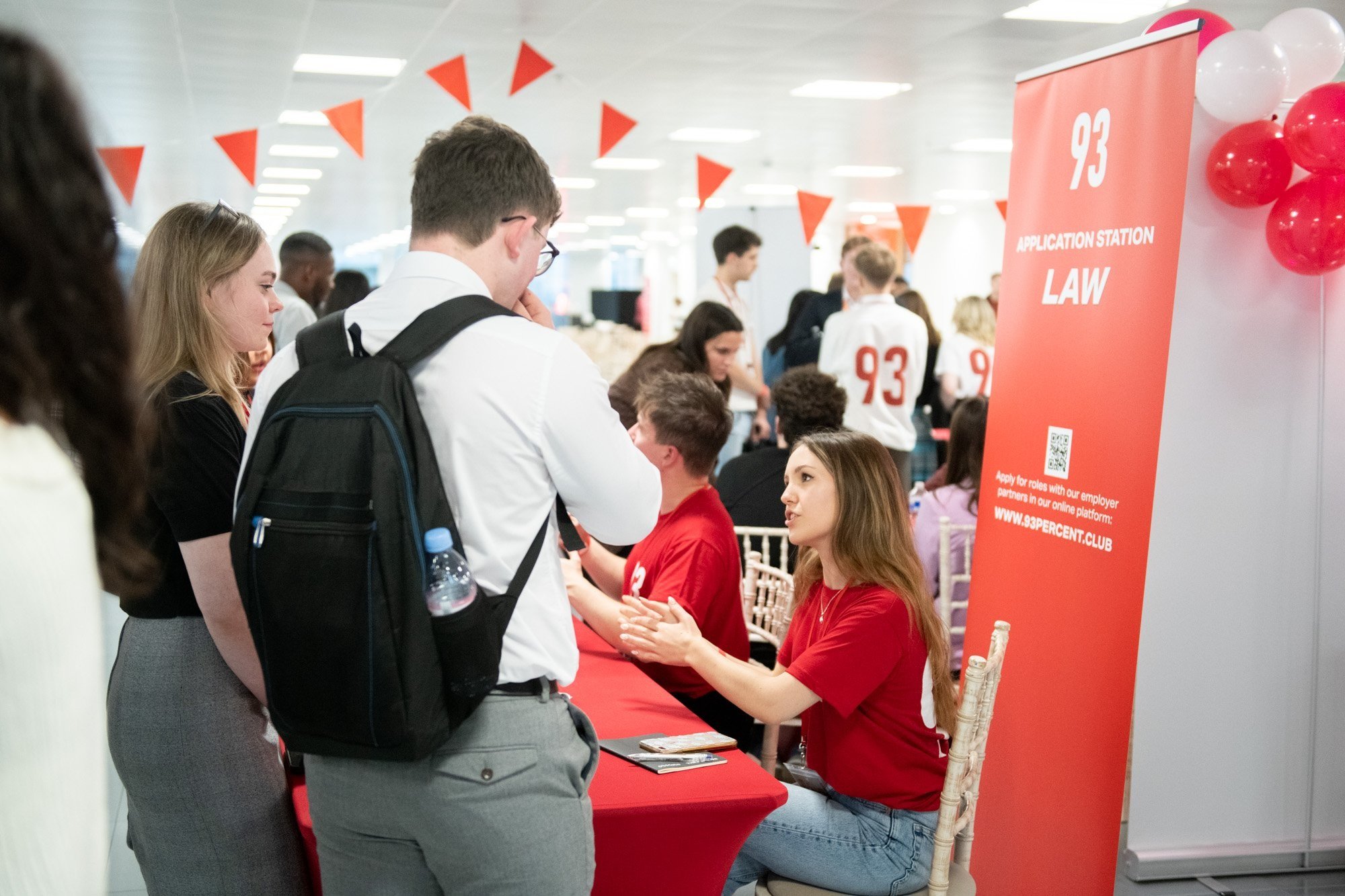Social mobility in law
93% of the UK’s population are state-educated and only 7% are privately educated. And yet, in the legal profession alone, the 7% who are privately-educated make up 22% of solicitors and 33% of barristers.
This disparity is not a coincidence, nor is it a reflection of ability. Rather, it reflects a systemic issue within the legal profession - a profession which, historically, has been reserved for the elite and privileged few.
However, the face of the legal profession is rapidly changing, with many law firms and chambers launching new programmes to help students from underprivileged backgrounds break into a career in law.
To help dismantle the class inequality that exists in Britain today, The 93% Club was created in 2016 by Sophie Pender, now a lawyer at Bates Wells.
Feeling that she didn’t fit in amongst her predominantly wealthy peers at the University of Bristol, Sophie started The 93% Club to create a community for all of the students who went to university without one. Now, 7 years later, The 93% Club is the country’s largest community of state-educated people, with 10,000 student members across 70 universities and 5,000 professional members.
To explain why The 93% Club is needed, we’ll introduce you to Emma and Naima, two students who have successfully entered the legal profession and who are passionate about continuing to improve access to careers in law. They’ll both share their journeys into the profession, discussing some of the barriers they faced and lessons they learnt along the way.
Emma’s story
Emma Shardlow
Future Trainee Solicitor at Clifford Chance
When I arrived at university, I thought the hard part - getting into Cambridge from an under-resourced state-school - was over.
Despite being told repeatedly that Cambridge wasn’t the place for me, I walked through the gates of my college as a freshly matriculated student thinking I had ‘made it’. I was now on an equal playing field with my more privileged peers.
But when I heard those students talking about this thing called ‘the Milkround’, and all of the ‘spring weeks’ and ‘first-year schemes’ they had secured, I quickly realised that I was not. This was a new language which I did not speak, and my school had not taught me how to speak it. I felt like I was behind before I’d even started.
“This was a new language which I did not speak, and my school had not taught me how to speak it. It felt like I was behind before I’d even started.”
Feeling lost and overwhelmed, I decided to attend a careers webinar, hoping to find out about this new world of internships, cover letters, and aptitude tests. It was on this webinar that I met Sophie Pender, founder of The 93% Club and a trainee solicitor at a top City law firm.
When Sophie shared her experiences of university and applying to careers in law, I was astounded by how similar they sounded to my own. Having realised that I wasn’t alone in my feelings of alienation, panic, and unpreparedness, I reached out to Sophie after the webinar and decided to set up my own 93% Club at Cambridge.
After founding the 93% Club Cambridge, a state-school society with over 1,500 members, I volunteered for the 93% Club Foundation - the national charity set up in 2020.
It was through volunteering for The 93% Club that I held my first client call, I negotiated the Club’s first contract with an employer, and I pitched the Club’s first national sponsorship strategy. These skills and experiences were invaluable in developing the professional skills that I needed for a career in law. Indeed, when I applied for vacation schemes and training contracts at commercial law firms, I drew heavily on these experiences and I believe they are what set me apart in the application process.
Having successfully secured two training contracts at Magic Circle law firms, I accepted a training contract at Clifford Chance - an opportunity which my younger self would never have thought possible.
I remain passionate about improving access to careers in law and supporting students from socially mobile backgrounds to navigate the hurdles of the application process.
As a member of The 93% Club’s alumni network, 93 Professionals, I currently mentor two aspiring lawyers. I believe that by reaching my hand back down the ladder, I can support more talented individuals into the legal profession.
Naima’s story
Naima Ali
Future Trainee Solicitor at Freshfields Bruckhaus Deringer
Both my secondary school and college are now closed down, with the former having repeatedly received an ‘Inadequate’ Ofsted rating.
If it came down to our flawed educational system to determine my path, I would not be destined for a place to study Law at King’s College London, and definitely not to receive multiple Magic Circle law firm training contract offers.
It was during college that I discovered the world of law and wanted to pursue a legal career. That dream was quickly shut down by my college’s ‘Careers Adviser’, who claimed law was not a realistic career path for me, so I should utilise the existing contacts the college had in other industries. At the time, my network was able to help me go as far as gaining work experience at my local library - not at a law firm like I was aiming for.
After taking matters into my own hands, I finally gained legal work experience by winning two national competitions hosted by top City law firms, earning £10,000 in funding for my college, work experience and a scholarship to study in university.
However, what I also gained was a false sense of hope when joining university and facing rejection after rejection for two years when applying for insight days and first year schemes. My CV was no match to the influential networks, mentors and application guidance my privately educated peers had. This was until I joined The 93% Club.
“My CV was no match to the influential networks, mentors and application guidance my privately educated peers had. This was until I joined The 93% Club. ”
In 2021, I joined the student-led National Committee of The 93% Club, managing all in-person and online engagements with sponsors. Overnight, suddenly, my network consisted of almost every head recruiter in the City’s top employers.
Through the relationships I built and maintained, connecting these employers with socially mobile students through events and access to opportunities, I was able to boost my employability to the extent of receiving multiple job offers.
Now, I continue to uplift my peers and improve access into the professional world through my volunteering and part-time work.
The 93% club
Stories like Emma’s and Naima’s are ones experienced by hundreds of thousands of students across the country.
That’s why, every year, The 93% Club reaches these students by hosting 100+ online and in-person programmes to up-skill, empower and connect state-educated students.
Through their programmes and events, The 93% Club provides an unrivalled opportunity for students from a diverse range of backgrounds to shape their career, boost their employability and meet people that will unlock even more opportunities for them in the future.
With our relentless focus on creating lasting change, we work collaboratively with employers, universities and charities to build high-impact activities that will connect their student members, develop their skills, and help them to access top careers that may otherwise have been out of reach.
Whilst many firms are working hard to improve access and break down structural barriers to social mobility within the legal profession, there is still a long way to go.
As it stands, we are missing out on the opportunity to raise UK GDP by as much as 6% (that’s £108bn) by increasing social mobility to the level of the next-best-performing country, the Netherlands.
For this to happen, systemic change and strategic action is needed in order to build a fairer future for the next generation of lawyers.




